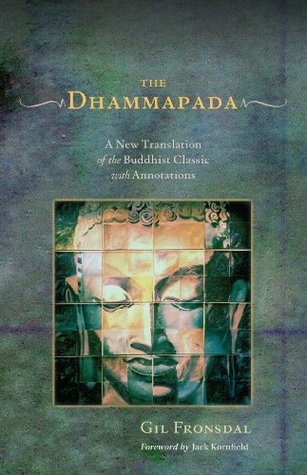More on this book
Community
Kindle Notes & Highlights
Therefore: You should follow a good, intelligent person Who is wise, insightful, learned, Committed to virtue, dutiful, and noble, As t...
This highlight has been truncated due to consecutive passage length restrictions.
Don’t get entangled With what you long for or dislike. Not seeing what you long for is suffering; So also is seeing what you dislike.
If one speaks the truth, Is not angry, And gives when asked, even when one has little, Then one comes into the presence of the gods.
If one focuses on others’ faults And constantly takes offense, One’s own toxins flourish And one is far from their destruction.
One is not just Who judges a case hastily. A wise person considers Both what is and isn’t right. Guiding others without force, Impartially and in accord with the Dharma, One is called a guardian of the Dharma, Intelligent and just.
One is not wise Only because one speaks a lot. One who is peaceful, without hate, and fearless Is said to be wise.
Gray hair does not Make one an elder. Someone ripe only in years Is called “an old fool.” It’s through truth, Dharma, harmlessness, restraint, and self-control That the wise one, purged of impurities, Is called “an elder.”
The wise person, who, As if holding a set of scales, Selects what’s good and avoids what’s evil Is, for that reason, a sage. Whoever can weigh these two sides of the world Is, for that reason, called “a sage.”
Going forth [into homelessness] is difficult—it’s hard to enjoy. Household life is difficult—it’s painful. Living with discordant people is suffering. A traveler is subject to suffering, So don’t be a traveler And don’t be subject to suffering.
As an elephant in battle Endures an arrow shot from a bow, So will I endure verbal abuse; Many people, indeed, lack virtue.
The tamed elephant is the one They take into a crowd. The tamed elephant is the one The king mounts. Best among humans is the tamed person Who endures verbal abuse.
If you find an intelligent companion, A fellow traveler A sage of good conduct, You should travel together, Delighted and mindful, Overcoming all dangers.
If you do not find an intelligent companion, A fellow traveler Of good conduct and wise, Travel alone,
Happiness is having friends when need arises. Happiness is contentment with whatever there is. Happiness is merit at the end of one’s life.
Sorrow grows Like grass after rain For anyone overcome by this miserable craving And clinging to the world.
Sorrow falls away Like drops of water from a lotus For anyone who overcomes this miserable craving And clinging to the world.
Just as a felled tree grows again If the roots are unharmed and strong, So suffering sprouts again and again Until the tendency to crave is rooted out.
Surrounded by craving, People run around like frightened hares. Held by fetters and bonds, They suffer, repeatedly, over a long time.
A strong bond, say the wise, Is infatuation with jewels and ornaments And longing for children and spouse— That bond is weighty, elastic, and hard to loosen.
Weeds are the ruin of fields; Ill will is the ruin of people.
Anyone who doesn’t cherish as “mine” Anything of body-and-mind And who doesn’t grieve for that which doesn’t exist, Is indeed called a bhikkhu.
Bhikkhu, be absorbed in meditation; Don’t be negligent; Don’t let your mind whirl about In sensual desire. Don’t be negligent and swallow a [molten] iron ball, And then, being burnt, cry out, “This is suffering!”
If one is friendly by habit And skillful in conduct, One will have much delight And bring an end to suffering. (376) As jasmine sheds its withered flowers So, bhikkhus, shed passion and aversion.
Who has rejected the world’s bait Is called “one at peace.”
Not by matted hair, not by clan, Not by birth does one become a brahmin. The one in whom there is truth and Dharma Is the one who is pure, is a brahmin. (393) Fool! What use is matted hair? What use is a deerskin robe? The tangled jungle is within you And you groom the outside! (394) Someone robed in discarded rags, Lean, with veins showing, Alone in the forest, absorbed in meditation, I call a brahmin. (395) I call no one a brahmin For being born from a womb, from a mother.
Whoever is unopposing among those who oppose, Peaceful among the violent, Not clinging among those who cling, I call a brahmin.
Whoever, having given up liking and disliking, Has become cooled, without attachments, A hero overcoming the entire world, I call a brahmin.
Whoever knows in every way The passing away and reappearing of beings, And is unattached, awakened, and well-gone, I call a brahmin.


